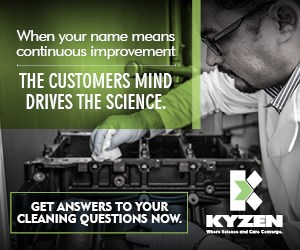Solving Your Technical Problems
Sharing technical and shop information and working with others in the industry to solve problems in these areas are the biggest benefits of attending the Precision Machined Products Association’s annual National Technical Conference (NTC), to be held May 3 - 5 at the Greater Columbus (Ohio) Convention Center.
Goal Of PMPA’s National Technical Conference
Sharing technical and shop information and working with others in the industry to solve problems in these areas are the biggest benefits of attending the Precision Machined Products Association’s annual National Technical Conference (NTC), to be held May 3 - 5 at the Greater Columbus (Ohio) Convention Center.
With a focus of “Lean Towards Profitability,” this year’s conference is aimed at helping PMPA members raise quality standards to produce parts with little to no waste. “We’re trying to produce better products, lower our costs and offer our customers a better piece-part price,” says David Sibinski, PMPA’s chairman of the National Technical Conference Committee.
“We’re not talking about lean and mean, because that implies something completely different,” explains Dick Zahniser, PMPA’s technical director. “What we’re looking at is the idea of lean manufacturing, presenting ways of eliminating waste. We’re talking waste of time and waste of product, especially bad product.” Included in that theme will be case studies illustrating how a precision machined products company can become lean in its production processes.
The organizers are hoping this year’s conference theme will spur PMPA members and other attendees to once again share their ideas with each other on how they have improved their own operations. “It’s an amazing conference and an amazing organization,” says Mr. Sibinski, senior process engineer for Roberts Automatic Products. “If you go to the conference, it erases the mystique of joining up with your competitors. We help our fellow members enhance their businesses so that we can all be strong producers of precision machined products.”
Sharing Information And Ideas
“There’s a huge, huge amount of sharing that takes place,” says Mr. Zahniser. “Even though attendees are potential competitors, they still share technical information, and that makes everybody better. It’s done in the formal sessions, during roundtable and discussion sessions, and it’s done in the evening. You’ll see people having a drink in the evening, and they’re not talking about sports, they’re talking about technical and shopfloor problems.”
Many of the conference’s sessions are designed to permit and encourage companies to share problem-solving information. Indeed, on Sunday, May 4, organizers have blocked out more than 2 hours of time for a session called “Practical Approaches to Achieving Zero PPM.” Mr. Sibinski says the goal is for representatives of precision machining companies of all sizes to share their successes and problems in reaching zero-defect production. “We have such a vast mix and a different combination of shops that we can teach one another. And with this information coming from our own members, it’s not viewed as a sales pitch. This is real-life stuff,” he comments.
“I Have A Problem”
During one of the three job planning roundtables, there is a break-out session called “I Have A Problem,” an open forum “staffed by the experts” from engineers to operators, which is designed to help solve the issues that production and technical professionals are having, Mr. Sibinski says. “Anyone in the audience who has experienced the same problem or something similar can offer up their solution.”
All of these sessions, however, also provide the machine tool builders–many of whom will be exhibitors at the Precision Machining Technology Show that follows the conference–with feedback on their products, how they are used and the problems shops encounter with them. “The machine tool builders listen very carefully to understand how we’re using their machines so they can identify future improvements,” Mr. Sibinski notes.
The job planning roundtables are “one of the mainstays that draw people into our conference,” Mr. Sibinski explains. The three roundtables provide for some of the most open periods of idea-sharing and problem solving. They are designed to allow attendees to jointly tackle a production or technical problem and attempt to solve it collectively. Each table offers up a solution, machine tool builders describe how their newest machines would produce the part, and then the precision machining company that actually produced the part is invited to describe how its employees solved the problem.
Converting Ideas Into Profits
This year’s conference will be the 42nd such event organized by PMPA. Organizers are expecting about 450 attendees this year, down from the record set at NTC 2000. A big reason for the reduced attendance levels, of course, is the slow-growth economy in North America. That perplexes Mr. Sibinski, who notes that the value received from the conference outweighs the costs associated with it. “If you solve one problem out on the shop floor, that pays for the conference,” he says. “We send a number of shop people each year. They always come home with ideas that we can convert into profit.”
The conference, however, is not all technical problems and solutions. Michael Broome, a gifted speaker from Clover, South Carolina, who has addressed PMPA audiences in the past, will give this year’s keynote address. Mr. Zahniser says Mr. Broome will provide a humorous look at achieving a balance between professional and personal lives.
NTC 2003 wraps up the afternoon of Monday, May 5, when three concurrent sessions are offered. Two of the three are technical—Datum Point Tapping, presented by John Detterbeck of Lester G. Detterbeck Co., and Taps And Tooling, presented by Dave Miskinis of Kennametal Greenfield. However, the third session is in keeping with the Technical Conference Committee’s goal of providing one non-technical issue. This year, Roger Zimmerman of Polaris Business Resource Center will talk about “The Art and Magic of Listening.”
Read Next
Seeing Automated Workpiece Measurement in Real Time
User-friendly inspection software for CNC machining centers was shown at IMTS 2024 monitoring measurements between and after machining while performing SPC based on recorded measurement values.
Read MoreA Tooling Workshop Worth a Visit
Marubeni Citizen-Cincom’s tooling and accessory workshop offers a chance to learn more about ancillary devices that can boost machining efficiency and capability.
Read MoreDo You Have Single Points of Failure?
Plans need to be in place before a catastrophic event occurs.
Read More

















